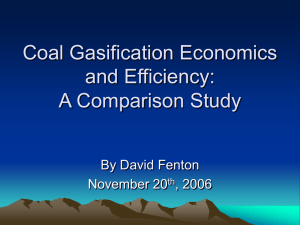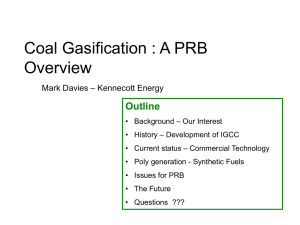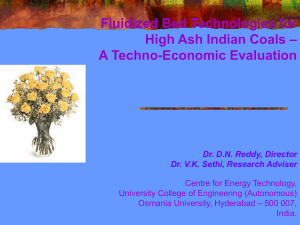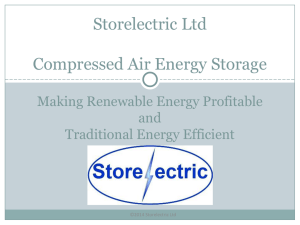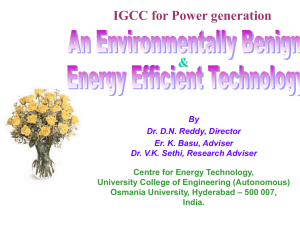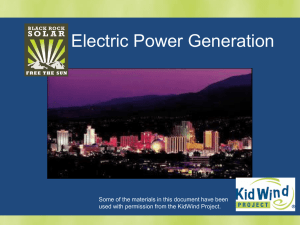45 MW Micro Hydel Project
advertisement
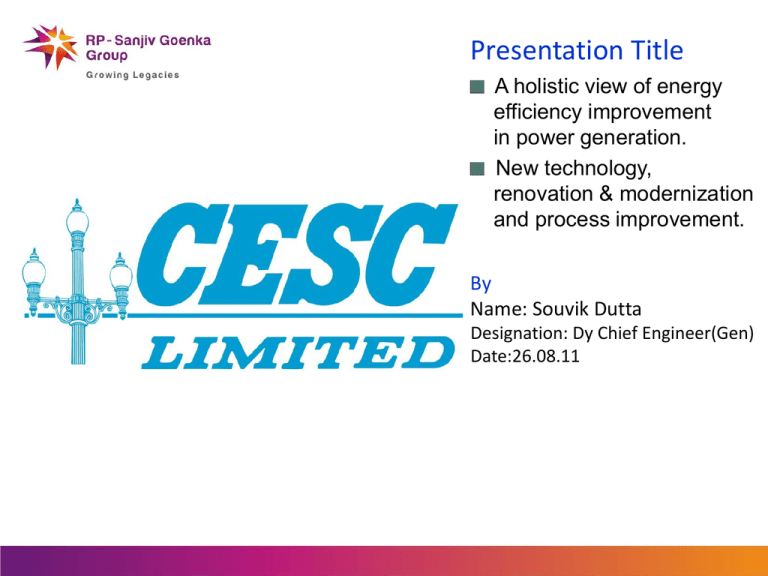
Presentation Title A holistic view of energy efficiency improvement in power generation. New technology, renovation & modernization and process improvement. By Name: Souvik Dutta Designation: Dy Chief Engineer(Gen) Date:26.08.11 A holistic view of energy efficiency improvement in power generation. New technology, renovation & modernization and process improvement. Solutions New Technology Technology Renovation & Modernization Process Improvement Solutions Major Initiatives for higher efficiency…… Adoption Supercritical, Ultra supercritical Technology Adoption of Combined cycle Technology Adoption of Integrated Gasification Combined Cycle (IGCC) Suitable for Indian Coal Adaptation Supercritical / Ultra supercritical Technology Development of Ultra Mega Power Projects (UMPPs) has been identified as a thrust area in order to increase plant efficiency. These are very large sized projects with supercritical technology, approximately 4000 MW each involving an estimated investment of about Rs. 16,000 crore each. Adaptation Supercritical / Ultra supercritical Technology Salient features of the Plant and Choice of Technology • The Ultra Mega Power Projects would use Super Critical Technology with a view to achieve higher levels of fuel efficiency, which results in saving of fuel and lower greenhouse gas emissions. • Flexibility in unit size subject to adoption of specified minimum Supercritical parameters. • Integrated power project with dedicated captive coal blocks for pithead projects. • Coastal projects to use imported coal. Solutions 43% Gross Efficiency, GCV Basis 42% 320/600/620 Pr/MST/RHT 41% (800-1000 MW) 280/600/620 (800-1000 MW) 247/565/593 40% (660/800 MW) 247/537/565 (660 MW) 39% 170/537/537 (500 MW) Current scenario 38% ‘00 ‘02 Xth Plan ‘07 XIth Plan ‘12 XIIth Plan ‘17 XIIIth Plan ‘22 Heat Rate Improvement (%) Heat rate Improvement Over The Years 14 12 10 8 6 4 2 0 P = 130 ata MST = 537 RHT = 537 200 LMZ (1978) P = 150 ata MST = 537 RHT = 537 P = 170 ata MST = 537 RHT = 537 200 KWU (1979) 500 KWU (1982) P = 170 ata MST = 537 RHT = 537 500 KWU Mod (1998) P = 170 ata MST = 537 RHT = 565 500 High RH (2006) P = 247 ata MST = 537 RHT = 565 660 SC P = 247 ata MST = 565 RHT = 593 660/800 SC Parameters for Higher Efficiency…… Plant Type Unit Size (MW) Main Steam Pr (Bar) Main Steam (Temp 0c) Reheat (Temp 0c) Notes Sub critical 500 170 537 537 Common practice in India Low Supercritical 660 247 537 565 India’s first supercritical station at Mundra by Adani High Supercritical 660/800 247-280 565 593 Parameters for Mundra Tatapower Ultra Supercritical 1000 295 600 600 In operation in Japan/China Ultra Mega Power Projects : Indian Scenario Projects under process Concerns: Viability at agreed upon tariff due to changed scenario of imported coal Orissa Integrated Power Ltd Akaltara Power Ltd Coastal Karnataka Power Ltd Coastal Tamil Nadu Power Ltd Tatiya Andhra Mega Power Ltd Sakhi Gopal Integrated Power Co Ltd Orissa Gogarapalli Integrated Power co Ltd Orissa Coastal Maharashtra Mega Power Ltd Ultra Mega Power projects awarded through tariff based competitive bidding route. Plants have higher operating parameters and increased efficiency levels. Name of project Name of Date of LOI Levelised & capacity as per successful Tariff(Rs/Kwh) LOI bidder Mundra Gujrat(5X800 MW) M/S Tatapower Ltd 28/12/06 2.26 Sasan M.P(6X660 MW) M/S Reliance Power Ltd 01/08/07 1.19 Krishnapatnam Andhra pradesh(5X800 MW) M/S Reliance Power Ltd 30/11/07 2.33 Tilya Jharkhand(6X660 MW) M/S Reliance Power Ltd 12/02/09 1.77 Ultra Supercritical 1000 MW units in China WAIGAOQIAO THERMAL POWER STATION PHASE-III:2X1000MW SHANGHAI, CHINA Adoption IGCC (Integrated gasification combined cycle) Technology An integrated gasification combined cycle (IGCC) is a technology that turns coal into gas—synthesis gas (syngas). Excess heat from the primary combustion and generation is then passed to a steam cycle, similarly to a combined cycle gas turbine. This then also results in improved efficiency compared to conventional pulverized coal.( 46% to 52%) In the IGCC plants, the production of CO2 during the gasification process offers the opportunity for relatively low-cost CO2 capture and storage (CCS), which may give the future IGCC plants some competitive and environmental advantages over super critical plants IGCC (Schematic diagram of the process) IGCC (Schematic diagram of the process) COOLED GAS AND GAS COOLING CYCLONE NITROGEN COMBUSTOR DUST FILTER COAL PRESSURISATION LOCKHOPPER STEAM STEAM TURBINE ALTERNATOR TURBINE AIR DRIED ASH/ CHAR COAL COMPRESSOR AIR BUFFER / WEIGHING HOPPER TO STACK CLEANED GAS BOILER COAL DRYING CONDENSER WATER PUMP EXHAUST GASES AIR STEAM TURBINE CO2 ASH/ CHAR HEAT HOT GAS GAS TURBINE DRYER GASIFIER CLEANING RECOVERY IGCC Efficiency and reliability improvements are also expected for the IGCC technology. Its efficiency is estimated to grow from 46% in 2010 to 52% in 2020. Some major IGCC plants, worldwide 580 MW, Kentucky Pioneer Energy, USA 512 MW, ISAB Energy, Italy 342 MW, Nippon Oil Corporation Refinery, Japan 335 MW, Elcogas, Spain 250 MW, Tampa Electric Company, USA IGCC India first IGCC power plant is coming up at Vijayawada, foundation for which has been laid. The 125 MW plant will be built in the premises of Vijayawada Thermal Power Plant (VTPS). BHEL and APGENCO has jointly funded this project. The main constraint of IGCC technology is cost (+35%), more land requirement and higher auxiliary consumption for producing syn gas. 250 MW IGCC plant: Tampa Electric Company, USA Solutions Renovation and Modernization (R&M) as per CEA guidelines Increase in availability and plant load factor of thermal power stations Renovation and modernization for achieving higher efficiency levels. Setting minimum acceptable standards & plan for R&M for projects below standard with clear cost benefit analysis If economic operation does not appear feasible through R&M, then there may be no alternative to closure of such plants as the last resort. In cases of plants with poor O&M record a change of management may to be considered so as to improve the efficiency to acceptable standards. NEED FOR R&M – EXISTING UNITS Improvement in performance parameters – PLF, availability, heat rate/efficiency, auxiliary power consumption, partial loading & forced outage. Restore derated capacity Extension of economic life. Obsolescence & non availability of spares (eg C&I) Environmental issues/other statutory requirements. Safety requirements. FUTURE APPROACH TOWARDS R&M NEAR PAST In-kind replacement Restoration of lost capacity FUTURE Cost effective technology upgrades Uprating of capacity Attain design efficiency Improve upon design Efficiency Reactive R&M Pro-active R&M From Time based R&M Condition Monitoring & R&M Optimisation through cost benefit evaluation R&M and Life extension program (LEP) during 11th plan(2007-11) Sl No Particulars R&M LEP I Number of thermal power stations 21 23 Ii Number of thermal units 76 53 Iii Estimated cost in Rs crores 4487 12433 iv Total capacity involved 18965 7318 INDIA: Power generation Capacity in MW as on 30th June 2011. Source: CEA website. Capacity in MW as on 30th June 2011. Source: CEA website. 180000 176.99 Billion watts 160000 140000 120000 54.66% 100000 96.74 Billion watts MW 80000 21.53% 60000 10% 40000 0.68% 20000 11.02% 10.43% 2.7% 0 Coal Gas Diesel Neuclear Hydro Renewable Source of power Total Captive INDIA: Power generation Capacity (Billion Watts) for Coal/Lignite based plants >25 MW capacity Results of R&M 96.74 100 90 80.44 74.91 80 65.93 70 58.59 60.65 61.15 67.78 69.89 70.56 62.72 60 50 40 30 20 10 0 20002001 20012002 20022003 20032004 20042005 20052006 20062007 20072008 20082009 20092010 Jun-11 Year 2009-2010 77.68 77.22 78.75 80 2008-2009 77.03 78 2007-2008 2006-2007 73.71 74.84 76 2005-2006 2004-2005 72.96 72.34 74 2003-2004 2002-2003 PLF % 69.97 68.74 70 2001-2002 2000-2001 National Thermal plant performance (Coal lignite based>25 MW) (PLF) Results of R&M 72 68 66 64 62 Year 2010-2011 2009-2010 84.24 85.1 85.05 84.76 Results of R&M 2008-2009 83.72 86 2007-2008 81.78 85 2006-2007 2005-2006 82.93 84 2004-2005 81.93 81.83 83 2003-2004 2002-2003 79.91 PAF % 2001-2002 79.84 81 2000-2001 National Thermal plant performance (Coal /lignite based>25 MW) (PAF) 82 80 79 78 77 Year 2009-2010 2008-2009 8.17 8.4 2007-2008 8.34 8.33 8.29 8.44 8.6 2006-2007 2005-2006 2004-2005 2003-2004 8.57 8.53 8.8 2002-2003 9 8.72 9.05 9.01 9.2 2001-2002 Aux % 2000-2001 National Thermal plant performance (Coal /Lignite based>25 MW) (Aux%) Results of R&M 8.2 8 7.8 7.6 Solutions Process parameters to be improved…… Auxiliary power consumption Heat rate Oil figure Plant load factor Plant availability factor Reduction of Auxiliary power consumption Southern Generating Station. CESC Ltd Commissioning of Variable Frequency Drives for U#2 ID Fans in February 2011 Objective: To reduce auxiliary power consumption VFD ESSENTIALS Make: Leader & Harvest Electric Technologies Co. Ltd, China Indian Partner: Yantra Harvest Energy Pvt. Ltd, Pune Product : Medium-Voltage VFD Model: HARSVERT – A06.6/50 Rated Input Voltage: 6.6 KV Rated Capacity: 450 KW Rated Output Current : 50 A Output Frequency Modulation: 0-50 Hz Output Voltage Modulation: 0 – 6.6KV Control Mode: Sinusoidal multi-level Pulse Width Modulation VFD ESSENTIALS Harvest MV Drive consists of Input Transformer Power Cell Control System VFD ESSENTIALS Multi-winding Phase Shifting Input Transformer (Dry-type) comprising of 18 nos. Secondary (6 Per phase with Phase-shifted at 20,10,0,-10,-20 Degrees for 36-pulse rectification) & 1 no. Auxiliary Winding for Supply to Cooling Fans of Power Cabinet Primary Winding Rating : 6600V / 49.4 A Secondary Winding Rating: 710V / 25.5 A Auxiliary Winding Rating : 380 V/ 12.2 A The Equipment ID fan reduction in auxiliary power consumption after installation of VFD Unit Load Particulars Pre-VFD period Post-VFD period ID fan 370 KW Payback for two fans:18 to 229 20 KW average months load (KW) Full load Net savings per fan 133.5 KW 75 MW AC load (KW) NIL 7.5 KW 36 % savings Part load ID fan average load (KW) 335 KW 159 KW 168.5 KW NIL 7.5 KW 50-55 MW AC load (KW) Note: Above Readings are in winter months. Expected AC Load in Summer : 25 KW 50 % savings Forthcoming VFD projects in CESC Ltd in the current financial year. Southern Generating Station: Installation of four numbers VFD’S for two ID fans & two FD fans of Unit no 1. Project: cost 410 lakhs. Titagarh Generating Station: Installation of VFD,S for two ID fans in one unit.Project cost: 200 Lakhs Southern Generating Station. CESC Ltd :Micro Hydle project Basic concept Southern Generating Station. 45 KW(3x15 KW) Micro Hydel Project ph-1 Supplier: Pentaflow Hydro Engineers.Delhi Specifications of the 15KW micro hydle turbine generator set • Rated capacity: 15KW (At Generator output) • Rated net head: 1.8 m • Rated discharge: 1 m3/s • Type of turbine: Propeller 4 blade inverted siphon • Rated turbine speed: 360 rpm • Runner diameter: 1000 mm • Type of generator: Induction • Method of drive: Flat belt • Turbine efficiency: 86% Southern Generating Station. CESC Ltd Commissioning of phase -1 of the project completed in February 2011 Average 12-14 KW is being generated from the first 15 KW unit In subsequent phases another two such sets will be commissioned Auxiliary Energy Saved Electricity saved each year considering import for 75% time of a day for 350 days in a year 15 KW X 8400 hrs/year X0.75= 94500 KW-h / Year This is equivalent to a savings of Rs 435000 / year With a project cost of Rs 14.3 lakhs/unit payback is approximately3.3 years In the subsequent years other than minor maintenance costs 100% savings will be achieved For three such units the projected savings will be approximately Rs 10 lakhs Micro hydle during installation Thank You !

